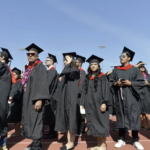The report—created by a market research firm—also found that they need “trusted resources” for mental health and skills development.
By Sameer Rao
ColorLines, May 24, 2016 —

Photo of a group of young Black men featured in “Heard, Not Judged: Insights Into The Talents, Realities and Needs Of Young Men Of Color,” provided by MEE Productions to Colorlines on May 24, 2016. Photo: Provided by MEE Productions to Colorlines
Young Black and Latino men need trusted pathways to skills development and mental health resources to succeed, according to a new report.
Market research firm Motivational Educational Entertainment Productions drew from the results of nine focus groups to develop “Heard, Not Judged: Insights Into The Talents, Realities And Needs Of Young Men Of Color.” The groups featured Black and Latino men ages 18 to 24. The researchers sought to understand how to help boys and men of color (BMOC) succeed in their personal and professional lives:
BMOC are extremely stressed out, taken off task by distractions and temptation, don’t believe in the American Dream and can barely see beyond surviving. They feel trapped at the bottom of the ladder because of a lack of resources, negative peer pressure and racism. They are afraid to fail and lack awareness and trust of resources currently available to help them.
The study’s key findings cited family values, importance of education, holistic physical and mental health and fighting stress as extremely important to BMOC. Researchers also wrote that trust and useful branding are the “two critical, missing ingredients” barring BMOC from accessing critical resources:
BMOC do not trust many providers of the available resources, because they don’t really know the “people behind the services.” Most providers, whether online or in the community, are not seen as credible or culturally relevant. For example, many mentoring resources may go unused because BMOC don’t know or trust the organizations that offer them. BMOC forge personal connections with those they come to believe truly care about them.
We also know that BMOC respond to branding in the consumer and entertainment spheres. They have been critical to the success of culturally-specific global entertainment-based brands such as Nike, Apple and Beats by Dre. Can the same type of branding used by these industry giants be used to aggressively market pro-social behaviors and self-development? We know of no agencies or programs that have tried it.
View the full report here.










